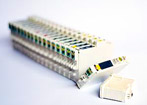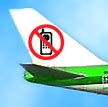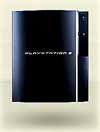Panasonic hid evidence that workers were poisoned at a battery factory, a report in a Chinese newspaper claims. Even pregnant women were not warned they might have been exposed to high levels of Cadmium, a potentially lethal heavy metal, the report alleges, quoting a manager who says he was laid off when he threatened to turn whistleblower.
The allegations are being made by a former human resources manager according to an article in the 21st Century Economic Report, a newspaper published by China's respected Southern Daily Group (Linked sites are in Chinese).
 Panasonic has not yet responded to a request for comment on the case, which is claimed to have taken place over the past three years at a factory (photo) manufacturing rechargeable Nickel-Cadmium batteries in Wuxi, north of Shanghai.
Panasonic has not yet responded to a request for comment on the case, which is claimed to have taken place over the past three years at a factory (photo) manufacturing rechargeable Nickel-Cadmium batteries in Wuxi, north of Shanghai.
Exposure to even tiny amounts of Cadmium is known to increase the risk of cancer and can lead to a variety of crippling and potentially-fatal health conditions.
'Health reports buried', claim
The newspaper's source, named as ex-human resources manager, Pan Wei, claims he was hired by the company in October 2006. Later that same month, he told reporters, the company doctor gave him safety reports on Cadmium exposure to sign.
The original health tests showed that ten staff had Cadmium levels above safety limits, Mr. Pan said. However, an overall safety report stated that no staff had any such problem.
The doctor told Pan that this was normal procedure, and staff with dangerous Cadmium exposure were rotated to different work until their health reports improved, the ex-manager alleges.
Continued for three years?
According to the newspaper article: “Pan realized that since 2003, the company has handled the staff health examination every year, and every year the examination says all the staff have no problem, so none of the staff have been notified of the real poisonous Cadmium level”
The story continues: “The doctor said, this is our normal procedure. The director of the factory has signed his name, and higher people above have signed their names too. So you sign your name and there will be no problem”
Pregnant workers affected, report claims
 Some workers had left the factory to work at other jobs where they might be exposed to Cadmium poisoning, without realizing they already had dangerous levels of Cadmium in their bodies, Pan alleges. In addition, he says, some of those affected were pregnant.
Some workers had left the factory to work at other jobs where they might be exposed to Cadmium poisoning, without realizing they already had dangerous levels of Cadmium in their bodies, Pan alleges. In addition, he says, some of those affected were pregnant.
Pan claims he was laid off after he demanded executives warn these workers of the risk. Panasonic informed him he had not performed satisfactorily during his probationary employment period, he says.
Panasonic is a trading name of Japan's giant Matsushita Electric Industrial group. The company has not yet responded to a request for comment on this case.
Public perception
Leading Japanese firms such as Matsushita are major investors in Chinese manufacturing. However, Chinese people have mixed perceptions about Japan. While they admire the country's advanced economy and culture, they also tend to believe that Japan has abused China in the past, particularly during the Second World War, and has failed to apologize adequately.
This negative perception has been fed by a heavy diet of official anti-Japanese propaganda, including school text books which harp upon Japan's historical misdeeds.
In this environment, Japanese firms operating in China are highly sensitive to negative publicity which might combine with smouldering anti-Japanese sentiment to ignite a firestorm of criticism.
Update April 29: ' The website of the Wuxi battery factory was taken offline yesterday' - removed this line as the website was only taken offline temporarily and is currently accessible with no obvious changes from the previous version - thanks to anonymous commenter below.










The Wuxi Battery Factory has
The Wuxi Battery Factory has not been "taken offline". Your claim is a beat up. Shame.
Thanks for the tip - article corrected
Thanks for the tip - article corrected
Poisoned to make our electronics cheaper
It's ironic that this is the normality in low-paid developing country's manufacturing. Probably Panasonic uses higher standards than the local company there which have no safety standards
This is a messy thing, these
This is a messy thing, these workers should be protected and no further discussions about it. Panasonic should offer a concrete response or explanation and provide medical care for those affected. Generic drugs might not be enough in this case.
Of course they would cover
Of course they would cover up such incidents. If Panasonic didn't, it could seriously damage its public image. As it is, not everyone is aware of such incident.